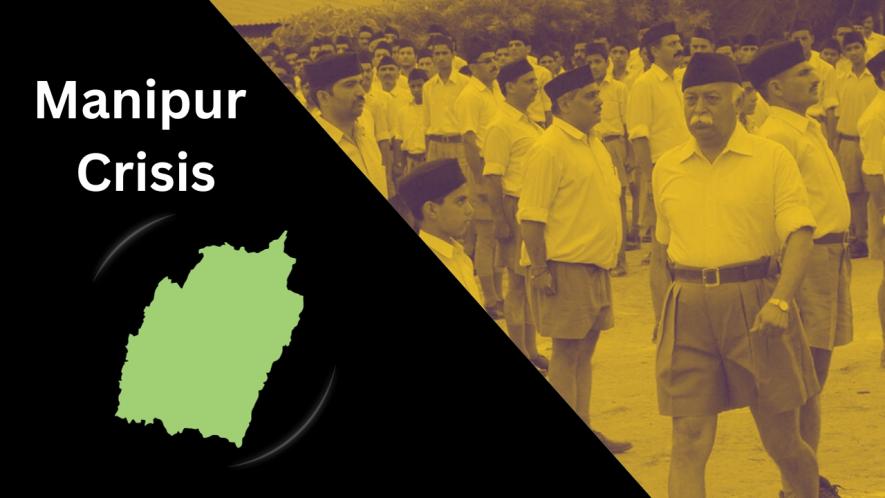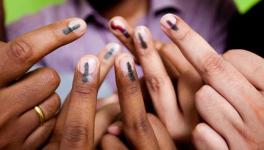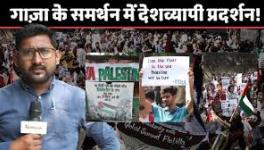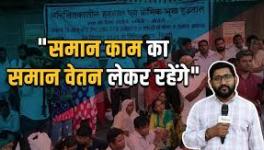RSS, Affiliates Keeping Track of Manipur, Issue Invariably on Agenda of Karyakarta Meet

Kolkata: The stark reality about Manipur is that the administration is faltering in making assessments, and the latest example of the failure is that the state was back on the boil on September 25. This happened just two days after Chief Minister N Biren Singh claimed a dip in violence and withdrew on September 23 the nearly five-month-old ban on mobile internet services that was clamped on May 3 following the outbreak of widespread Meitei-Kuki ethnic violence.
Consequently, the state government reintroduced the mobile internet ban on September 26, though for a short period and extended on September 27 the contentious Armed Forces (Special Powers) Act for another six months, except in areas covered by 19 police stations.
Sharing the failure to assess the ground reality is the Union home ministry, which appears to be limiting its role in reinforcing the security forces. As promised to Imphal, it sent more forces after the G20 mega event.
Significantly, the Rashtriya Swayamsevak Sangh (RSS), the ideological mentor of the ruling Bharatiya Janata Party, whose influence has steadily grown in the NDA regime, has been keeping a close watch on the Manipur situation through its network of 'karyakartas' as also of those belonging to its affiliates; in the case of strife-torn Manipur, it is the Akhil Bharatiya Vanvasi Kalyan Ashram (VKA).
Brief statements issued by RSS, particularly those after Prant Pracharak meetings, clearly suggest that the organisation's top brass keeps itself posted on the situation in Manipur. They find the situation tense and worrisome, and both sides must overcome the deep trust deficit.
The statement issued after the three-day coordination meeting in Pune a few days back was perhaps more forthright compared to the previous ones. The operative part read, "The situation in Manipur is tense, and this is what our volunteers reported to us in the meeting. We are all doing our work, but the government has to take decisions; as part of the RSS's work, our volunteers are in touch with both groups [Meiteis and Kukis], and service work is being done for both."
Sangh Parivar sources capable of interpreting RSS's statements say the portion "the government has to take decisions" deserves to be read between the lines and has both Imphal and New Delhi within its ambit.
The second point that emerges from NewsClick's talks with Sangh Parivar sources is that Chief Minister Singh's often expressed thinking of commissioning early work on the National Register of Citizens (NRC) to protect indigenous people and identify those not qualifying for citizenship is destined to remain a pious intention. Movement in this direction is very difficult in the foreseeable future.
"It's not just between Meiteis and Kukis; external forces, too, are at work. Myanmar is close by, and the ruling military junta, which is deep in trouble, is too keen to "export trouble to India" with others' help. It makes sense to suspect the China factor ", they added.
Inquiries suggest the concept of NRC won't be a bone of contention between the authorities – both state and Centre – and the parties to the prolonged ethnic conflict; they may, however, stipulate a humane, practical approach and urge the authorities to draw lessons from the controversial, unsuccessful NRC exercise in Assam conducted between 2013 and 2018 at a cost of over Rs 1,600 crore.
Media convener of Indigenous Tribal Leaders Forum Ginja Vualzong said, "NRC has not been successful in Assam; I have no issue with NRC, but I feel the timing is inappropriate. Also, 1951 has been proposed as the cut-off year. Then, not many roads reached the tribal areas; many tribals would not have registered themselves, and census officials would not have accessed the tribal areas. Therefore, the proposed NRC could prove tricky for the tribals."
Khaikhohauh Gangte, general secretary of Kuki Inp, which is the apex body in the state of Kuki tribes, had this to say, "We have no objection, as such, to an NRC exercise, but the timing is not suitable as what obtains now is 'statelessness'. The authorities must be accommodative and willing for adjustments as a lack of documentation is a fact of life in the hills. Awareness about NRC has to be created as NRC will be a demanding exercise, which may also be viewed as biased and discriminatory towards the Kuki-Zo community, more so against the backdrop of the Meitei narrative that Kuki-Zo people are foreigners / illegal immigrants, which we consider fictitious". Like in Assam, it may be ultimately a massive waste of taxpayers' money."
Gangte agreed that the Meitei demand for ST status may vitiate the atmosphere for an NRC exercise.
The Coordinating Committee on Manipur Integrity (COCOMI), an influential organisation of the Meiteis in the valley, has written to the Prime Minister's Office seeking early commissioning of an NRC exercise with 1951 as the base year "to identify the illegal immigrants, deprive them of citizenship [though they may continue to stay as guests, if necessary] ........ Manipur witnessed large-scale illegal immigration in the districts of Churachandpur, Chandel, Tengnoupal, Kamjong and Kangpokpi. They also started settling in the reserved and protected forests and started large-scale poppy cultivation."
The ongoing conflict is not religious or tribal versus non-tribal issue; it manifests the simmering tension over deforestation, opium/poppy cultivation and large-scale changes in demography in specific areas, COCOMI's letter to PMO argued.
In this context, Sangh Parivar sources told NewsClick that when the chief minister took steps to clear the forest areas which the administration thought were emerging as centres for narco-drug traffic, there were serious apprehensions among Kukis that in the vacated land Meiteis would be settled and tension started building up.
As for their demand for ST status, Meiteis have been arguing since 2012 that the status would help them preserve their ancestral land, tradition, culture and language. They have also argued that they were recognised as a tribe before the state's merger with India in 1949, but they lost that identity after the merger.
Available information also suggests that later in 1951-52, a commission set up by the Union government to study categorisation demands, Meiteis had an opportunity. Still, they did not place the ST demand before the commission. Kukis opposed Meiteis' demand as the latter could buy land in the hills.
In an article in Outlook, updated on May 29, it has been pointed out that the land of the indigenous tribal peoples in the hills of Manipur is protected by the constitutional provisions under Section 158 of MLR and LR Act 1960 (Parliamentary Act) under Art—371 C of the Indian Constitution.
For instance, per the existing law, non-tribals, including Meiteis, cannot purchase land in the hills. As is known, the ethnic conflict in Manipur was triggered by a protest organised by the All tribal Student Union in opposition to Meiteis' demand for ST status.
The writer is a Kolkata-based freelance journalist.
Get the latest reports & analysis with people's perspective on Protests, movements & deep analytical videos, discussions of the current affairs in your Telegram app. Subscribe to NewsClick's Telegram channel & get Real-Time updates on stories, as they get published on our website.
























